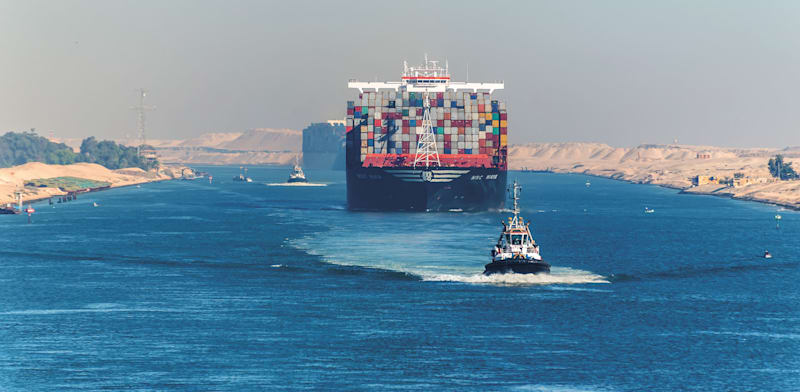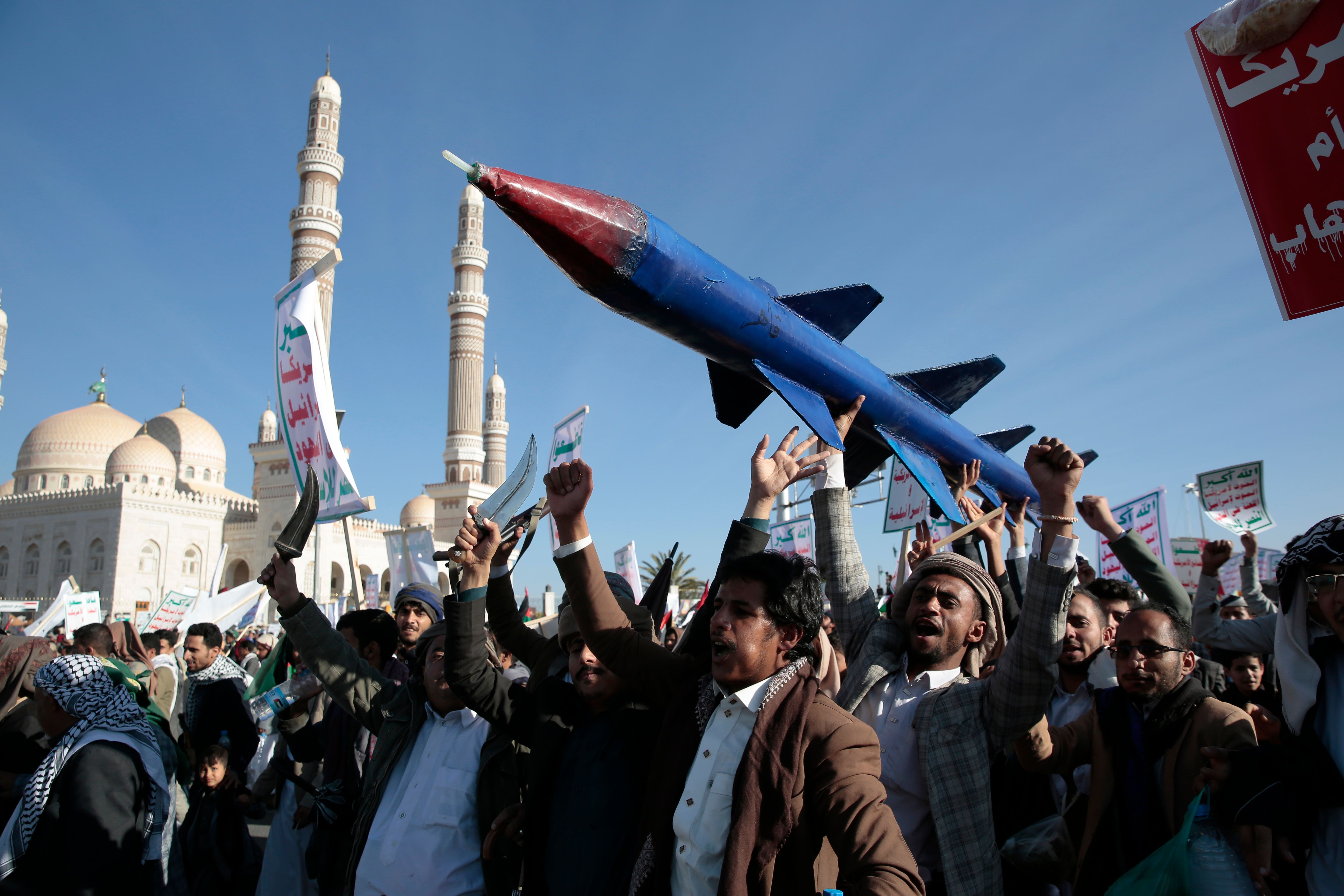Haitham El-Zobaidi: Egypt passive amidst looming Houthi threat

Some figures leaked by official Egyptian bodies say the economic fallout from the Red Sea war on Suez Canal revenues were expected to exceed US$7 billion by the end of 2024.
For now, Egypt is acting as if any attempt to prevent the Houthis from continuing the war, which theoretically opposes them to Israel, will lead to a higher material or human toll, and hence it is better to let the Houthis’ war in the southern Red Sea gradually degrade by itself rather than enter into a confrontation with the Yemeni militants.
From this perspective, the issue becomes a numbers game, in which whoever has the ability to show more patience ultimately wins. Of course, it is possible that Westerners, mainly the Americans and the British, could achieve their goal of damaging Houthi military capabilities, especially their stock of ballistic missiles and drones, thus letting the war nominally continue but without achieving any major result.

The conflict has extended to a wider geographical area witnessing the exchange of drones and missiles as the Houthis launch longer-range and faster, some say hypersonic, missiles.
Thus, the region has seen the Israelis enter the fray by launching fighter jet raids on selected Yemeni targets, especially economic sites, hence causing more and more harm to the Houthis, in order to make them understand that the theatrics of blocking sea routes is one thing but the targeting of Israeli civilian and military sites is something else altogether.
The Israelis are likely to inflict painful blows on the Houthis at the expense of the Yemeni people without considering the humanitarian toll, so that the Houthis may at some point stop their dangerous game.
In any case, the time factor is not in favour of Egyptians who at best find themselves fence-sitting in a war that adversely affects them and their economic capabilities increasingly every day. The Iranians benefit from the ongoing escalation by proving that they still hold some bargaining chips in the showdown. It is also Tehran’s way of showing it is not just uttering threats because it can request, (or order) its Houthi allies to proceed with their attacks whatever the cost.
“Some even argue that neglect is a strategy that deserves to be tested for over time, until the Houthis are fatigued, Iran changes its mind or the Gazans reach an agreement with the Israelis. This kind of assessment is, at best, a confirmation of the inability of Cairo to come up with a solution that is appropriate for a major regional power such as Egypt, which possesses one of the largest and best-equipped armies in the world.”
We do not know exactly how much each Houthi missile or drone costs. But the price tag will certainly not exceed a few tens of millions of dollars at best (including material launched and facilities destroyed on the ground), compared to the billions of dollars of revenues lost to Egypt in ship and tanker fees for transiting the vital Suez Canal waterway.
One must remember that the Egyptians have taken part in fierce wars with the West and Israel over Suez Canal revenues. The first of those took place after the nationalisation of the canal, which aimed to impose Egypt’s right to the canal’s revenues. The second war erupted over Israel’s strategic harassment and intimidation of Egypt during the time of Gamal Abdel Nasser. The Egyptians, who viewed the Suez Canal as the goose that laid golden eggs, have always felt that war was justified to protect the canal as a vital source of income.
Today, the Egyptian strategic assessment says that in the final analysis it is better to let the Israelis conduct strikes against Yemen in order for the Houthis to calm down, or to let the Americans and British counter the Houthi missiles and drones which target ships passing through the canal, the Bab al-Mandab Strait, or the Gulf of Aden. The idea is that eventually the Houthi stock of missiles and drones will be exhausted. Some even argue that neglect is a strategy that deserves to be tested for over time, until the Houthis are fatigued, Iran changes its mind or the Gazans reach an agreement with the Israelis.
This kind of assessment is, at best, a confirmation of the inability of Cairo to come up with a solution that is appropriate for a major regional power such as Egypt, which possesses one of the largest and best-equipped armies in the world.

This does not mean one should call on Egypt to cast the Houthis as enemies, whom they need to attack as soon as possible. Doing nothing is however unacceptable. There have many recent examples of Egypt’s refusing to do anything. There is a ring of threats around Egypt, from Libya down to Sudan; one that extends southward from the Nile Basin to the Renaissance Dam in Ethiopia and most of the Horn of Africa.
With every challenge, the Egyptian strategic situation seems to deteriorate further, with one or more parties feeling that the moment is opportune to further pressure Egypt, and even blackmail it, as long as it remains silent about the hostile action.
The expansion of such ambitions around Egypt seriously erodes the country’s regional position and may undermine the standing of the state itself. In the meanwhile, Egypt’s huge army, sitting idly by, has not been put to the test for decades.
A country such as Iran, for all its military capabilities, has failed its first real test against Israel’s modern military power. Israel neutralised the Iranians within days. Tehran’s collection of allies, including loyal states and militias, collapsed inexplicably. Worst of all was the inability of Iranian strategists to anticipate the link between the bombs, which began to fall in Gaza in mid-October 2023 and the collapse of Bashar al-Assad’s regime in early December 2024.
“If Iran strangles Egypt south of the Red Sea, Cairo can strangle Iran and the Houthis in the north. If one chokes Egypt under the pretext of pressuring Israel, Cairo can choke the assailant’s maritime routes by exercising its right not to be choked.”
This may be every bit as bad as the failure of Egyptian strategists to tell their country’s leaders that the tremors south of the Red Sea could spark a crisis in Egypt itself.
Cairo’s leaders know better than anyone that some of its enemies have been silently nurturing this potential Egyptian crisis for years and waiting for the right time to trigger it. Fear of a scenario in Cairo similar to that which unfolded in Damascus is no longer the talk of Iranian or Egyptian experts only. It is now the talk of ordinary Egyptians in the streets of Cairo as they ponder the issue while sipping a cup of tea in a café in the Citadel.
READ: Carter’s legacy was the making of Iran, Lockerbie & Hezbollah
Considering the multiple assets Qatar and Turkey had put in place in many parts of Syria before deciding to activate them at a key moment, from the start of the offensive in Aleppo to its culmination in Damascus, there is no need to count how much money Doha and Ankara have spent and how much effort they have devoted to preparing for an Egyptian moment similar to that in Syria. Cairo’s appearance of weakness, real or imagined, will tempt every interloper, not just the Qatari and Turkish. It is an invitation for any such interloper to take his chances with Egypt.

This is a looming danger which requires a psychological and strategic response from Cairo as soon as possible. Once again, this is not a call for war, but a warning to the Houthis and their sponsors in Iran that there is no difference between cutting off the livelihoods of Egyptians and trying to cut their throats, God forbid.
READ: Egypt’s account deficit increased, following Suez revenue plummet
The hunger that pinches the stomachs of Yemenis in Sana’a is no more painful than that which affects the dwellers of the poor neighbourhoods around major Egyptian cities.
Egypt should be sending an urgent message warning Iran and the Houthis that the Suez Canal is a vital artery that is not expendable nor can it be left to the whims of outsiders.
If Iran strangles Egypt south of the Red Sea, Cairo can strangle Iran and the Houthis in the north. If one chokes Egypt under the pretext of pressuring Israel, Cairo can choke the assailant’s maritime routes by exercising its right not to be choked.
Egypt needs to respond, and its response must come clearly and quickly.
Haitham El Zobaidi is the Executive Editor of Al Arab Publishing House. He is also chairman and publisher of The Arab Weekly and Al-Jadeed magazine. If you wish to pitch an opinion piece please send your article to alisa.butterwick@maghrebi.org.
Want to chase the pulse of North Africa?
Subscribe to receive our FREE weekly PDF magazine













